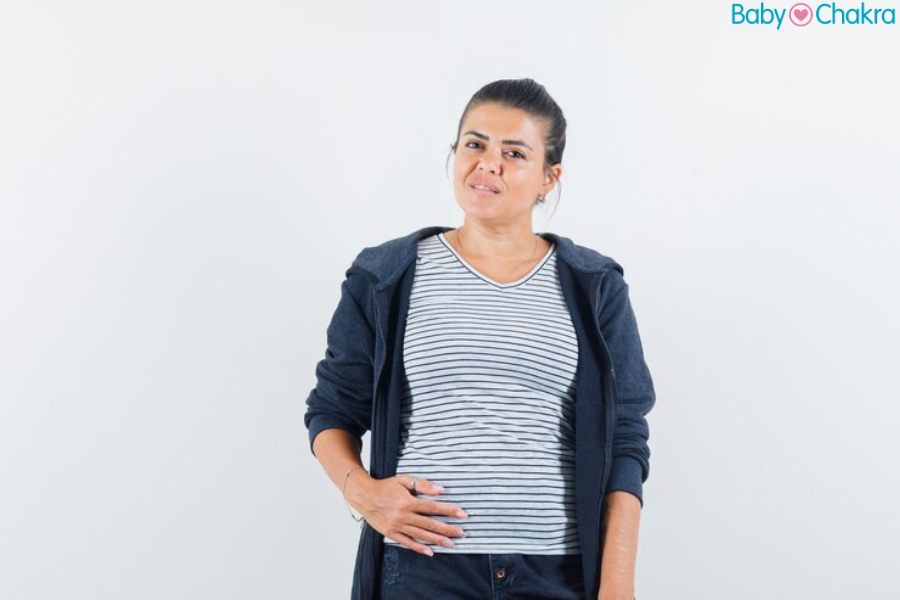
Managing Loose Motions During Pregnancy: Tips And Precautions To Follow
2 Mar 2023 | 4 min Read
Manisha Pradhan
Author | 1053 Articles
Pregnancy is a special time in a woman’s life, but it can also come with its fair share of discomforts. One such discomfort is motions or loose motions during pregnancy.
Also known as diarrhoea, loose motions during pregnancy can not only cause discomfort but can also be embarrassing, and even dangerous in severe cases. Know all about the causes of loose motions during pregnancy, how to manage the condition, and when you should be worried.
What Causes Motions During Pregnancy?
Motions during pregnancy can be caused due to many reasons, including hormonal changes, dietary changes, and stress. Some pregnant women experience motions in the first trimester due to hormonal changes that can affect digestion.
Later in the pregnancy, motions may be caused by pressure on the intestines from the growing uterus, dietary changes, or stress.
Some common dietary triggers for motions during pregnancy include:
- Spicy or greasy foods
- Dairy products
- Artificial sweeteners
- Caffeine
- High fibre foods
If you experience frequent motions during pregnancy, it’s important to identify the triggers and avoid them as much as possible. Keeping a food diary can help you identify which foods may be causing the problem.
How To Manage Motions During Pregnancy
If you’re experiencing motions during pregnancy, there are several things you can do to manage the condition and feel more comfortable. Here are some tips:
Stay hydrated
Diarrhoea or loose motions during pregnancy can cause dehydration, so it’s important to drink plenty of fluids. water, clear soups or broths, and drinks that contain electrolytes which help replace lost fluids.
Eat small, frequent meals
Eating small, frequent meals throughout the day can help keep your digestive system on track. However, make sure you stick to bland foods like rice and curd, bananas, and toast.
Avoid triggers
As mentioned earlier, certain foods can trigger motions during pregnancy. Identify your triggers and avoid them as much as possible.
Get plenty of rest
Pregnancy can be exhausting, and if you have motions during pregnancy, it can drain you of all energy, so it’s important to get plenty of rest. Taking naps during the day and getting a full night’s sleep can help your body recover.
Practice good hygiene
Motion during pregnancy can be caused by bacterial or viral infections, so it’s important to practice good hygiene. Wash your hands frequently, avoid close contact with sick people, and avoid sharing utensils or food.
When Should I See The Doctor If I Have Motions During Pregnancy?
In most cases, motions during pregnancy are not a cause for concern and can be managed at home. However, there are certain situations where medical attention may be necessary. Here are some warning signs to look out for:
- Blood in your stool
- Severe abdominal pain
- Fever
- Dehydration
- Contractions or preterm labour
If you experience any of these symptoms, it’s important to contact your healthcare provider right away. They can help determine the cause of your symptoms and provide appropriate treatment.
Motions during pregnancy can be uncomfortable, but they are usually not a cause for concern. By following the tips we have provided above, you can manage the condition at home. However, if you experience any warning signs such as blood in your stool, severe abdominal pain, or fever, it’s important to see your doctor right away.
Check out this pain relief oil to help you get relief from pregnancy related woes like pain and dry lips
Also Read:
Best Sleeping Positions During Pregnancy: A guide for every mum-to-be
5 Ways Every Mum-To-Be Can Look After Her Underarms: These tips make taking care of your underarms easy peasy
Cover image source: Freepik
A


Related Topics for you
Suggestions offered by doctors on BabyChakra are of advisory nature i.e., for educational and informational purposes only. Content posted on, created for, or compiled by BabyChakra is not intended or designed to replace your doctor's independent judgment about any symptom, condition, or the appropriateness or risks of a procedure or treatment for a given person.


